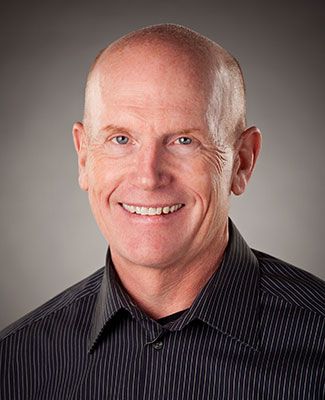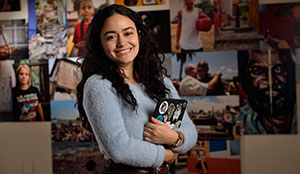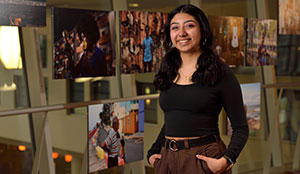Focused on the Big Picture
$17 million gift from alumnus Martin Vanderploeg creates scholars program for first-generation students and supports engineering faculty

Focused on the Big Picture
$17 million gift from alumnus Martin Vanderploeg creates scholars program for first-generation students and supports engineering faculty
March 25, 2022If you want to change the world, you need to think big.
That’s the advice you’d no doubt take away from listening to Martin (Marty) J. Vanderploeg, who recently made a $17.263 million gift to support MSU’s efforts to help first-generation students succeed and to support the faculty who can inspire them.
Marty, a technology industry leader who holds three degrees in mechanical engineering from MSU, believes in the power of big, public universities. Especially the big part.
“The state universities are where a real impact can be made,” he says. “They educate the masses and they do it the right way. The balance you get at a large state university—affordability, high-quality faculty, a rich environment for people to grow—is the most valuable educational resource we have in this country.”
What he believes on a macro level, he believes just as much on a micro level.
“You can’t have the same experience if you go to a place that is the same size as your high school, which I think hurts people’s development,” Marty says. “You have to go to a big place like MSU to get out of your comfort zone.”
So helping a lot of students succeed at MSU—especially those who might be facing some pretty big hurdles—is exactly the kind of big thinking Marty is after.
STARTING BIG

program that is specifically targeted for
first-generation students will go a long way
to help students like me feel like they are in
the right place, that they belong here.”
CHRYSTEL LOPEZ, '22
Students who are first-generation—meaning neither of their parents hold four-year degrees—can find getting to college daunting in itself. Resources once they arrive are essential.
Chrystel Lopez, senior in the Residential College in the Arts and Humanities (RCAH), remembers well, as a first-generation applicant to MSU, how difficult it was to find her way.
“When it came to SATs, applications, financial aid, scholarships, you name it, I was pretty much on my own,” says Lopez. “I think seeing a scholarship and support program that is specifically targeted for first-generation students will go a long way to help students like me feel like they are in the right place, that they belong here.”
Fellow RCAH senior Alyssa Briones recalls how much she valued a summer bridge program she attended before she came to MSU.
“My first semester at MSU was hard,” she says. “Without the friendship and support from the people I met that summer, many of whom were going through the same things as me, I probably would have dropped out.”

the people I met that summer, many of
whom were going through the same things
as me, I probably would have dropped out.”
ALYSSA BRIONES '22
First-generation students make up 21 percent of MSU’s student population. Many come from economically disadvantaged backgrounds and, unlike a lot of their peers, they may not have built-in financial support and family guidance to help them overcome all the stresses in higher education.
That was not the case for Marty.
“I was born on third base,” he says.
He grew up in a small, wealthy town (Midland). His father was an engineer, his mother a schoolteacher.
“The question was never if I was going to college, but only where?” he recalls. “Going to college was just programmed in from the day I was born.”
His parents met at Michigan State, and they gave him a steady, positive impression of the university—a feeling that led him to choose MSU as well.
After earning bachelor’s (1978), master’s (1980) and doctorate (1982) degrees, he became a mechanical engineering professor in Iowa and then a technology entrepreneur. He attributes much of his success to his time at a large, diverse public university and recognizes that for many bright, ambitious students, getting that kind of start is not always programmed in.
“At MSU there is all this diversity and all these different ways of thinking and looking, and that really opened me up to success,” Marty says. “I just wanted to make this gift to allow the best and brightest who are motivated to go to college but don’t have the means, to go and to be supported.”
The bulk of his gift—$12 million—establishes an endowment for the Vanderploeg Scholars Program at MSU, which will support first-generation students through multiple initiatives, including scholarships, summer bridge programs, extra academic advising, a study abroad opportunity and a mentorship program.
Endowed gifts are invested and only a portion of the earnings are spent each year, which delivers a steady, consistent and perpetual financial resource. To ensure that the scholar program could begin in 2022, Marty set aside a $200,000 portion of his total gift to cover immediate expenses.
MSU is deeply committed to providing an inclusive environment with the academic, social, wellness and financial support that enables all students to learn, thrive, persist, graduate and succeed after graduation. Closing opportunity gaps among subgroups of students is a key pillar in MSU’s Strategic Plan 2030, which was released this fall.
“We know that first-generation undergraduate students persist and graduate at much higher rates when they are supported both inside and outside of the classroom,” says Associate Provost for Undergraduate Education Mark Largent. “They flourish when they collaborate with other students from first-generation backgrounds, and when they see and hear their presence at MSU recognized and honored. Our inaugural Vanderploeg Scholars will arrive on campus already connected to a social and academic success network.
ENGINEERING INSPIRATION
Marty understands firsthand the critical role great faculty can play in inspiring students.
Another portion of his gift—$5 million—creates three endowed faculty positions, one named in honor of his father, Marvin L. VanDerPloeg. He also created an expendable research fund to strengthen the scope and scale of research capabilities in the college.
His own path through higher education was in part the result of a faculty mentor. After internship stints at Ford and Dow Corning in his undergraduate years, he knew he wanted to be qualified for higher-level thinking in his work. The allure of a few more years on campus, was also a strong pull that led him into a master’s program. Once there, he connected with a professor, Jim Bernard, who inspired him to stay for a Ph.D.
He landed a professor position initially at the University of Iowa, then followed Bernard, who had taken on the chairpersonship at Iowa State. He loved teaching. “I wish I had two lifetimes, because I would have kept doing that,” he says.
As a former professor, he knows the pressure on newcomers to fund and publish their research. “I wanted to alleviate some of that pressure, so great professors can really get their footing and have the flexibility they need to be successful,” he says.
The College of Engineering Dean Leo Kempel notes that the market for faculty talent is highly competitive, so the addition of resources to attract sought-after faculty experts is a remarkable opportunity.
“Michigan State has been preparing talented engineers to tackle society’s grand challenges for generations, and our incredible alumni continue to forge a path for future Spartans to build on this legacy,” he says.
MAKING FRIENDS ALONG THE WAY
How Marty would end up in the corporate world is another aspect of his life that was inspired at MSU. During the infamous nationwide 1978 blizzard, he recalls spending an entire weekend trapped with classmates in the Engineering Building. “Half the time we were there, we talked about starting a company one day,” he recalls.
Marty co-founded Workiva Inc., a cloud-based software technology company for managing business data, and Engineering Animations Inc., which specialized in computer assisted design software used in medical and forensic applications.
Looking back at all of his successes, he says the thing that makes him happiest and that he takes the most pride in is “running a business in a way that you make a lot of friends.”
That mindset naturally led to his philanthropic goals. “Giving back feels good,” he says. “To be able to do something to help others is the greatest accomplishment you can have.”
Likely, he’ll continue making a lot of friends.
LEARN MORE about how you can support Michigan State by contacting the Development Officer in your college or unit, or call (517) 884-1000.




